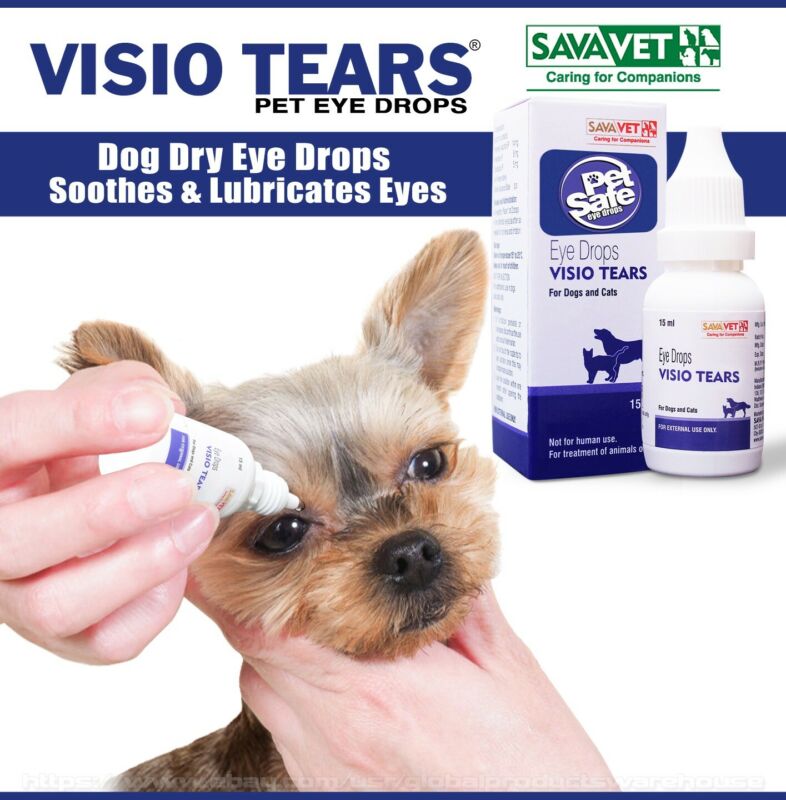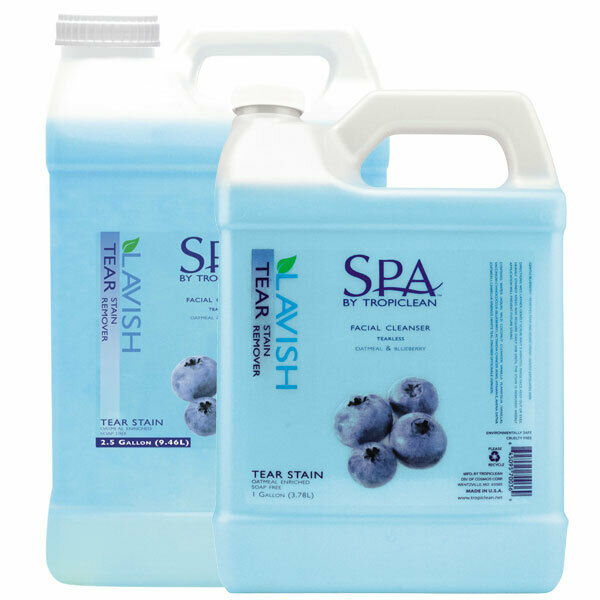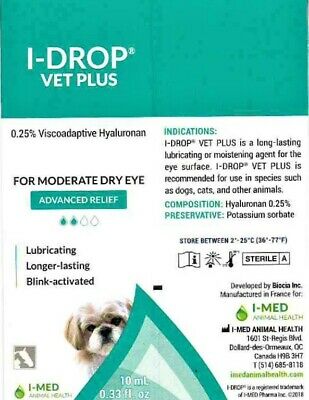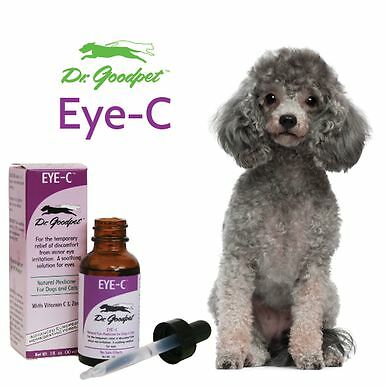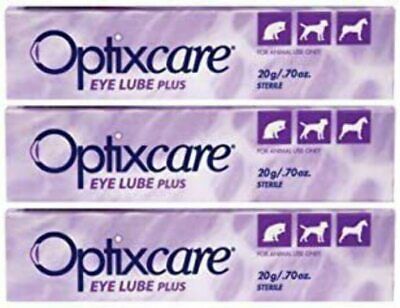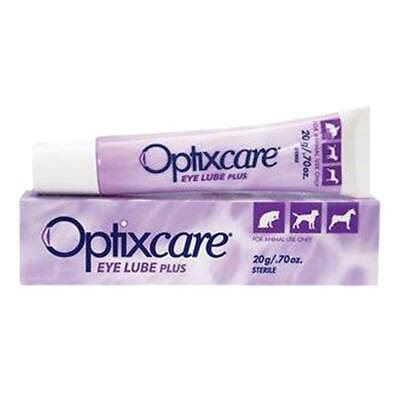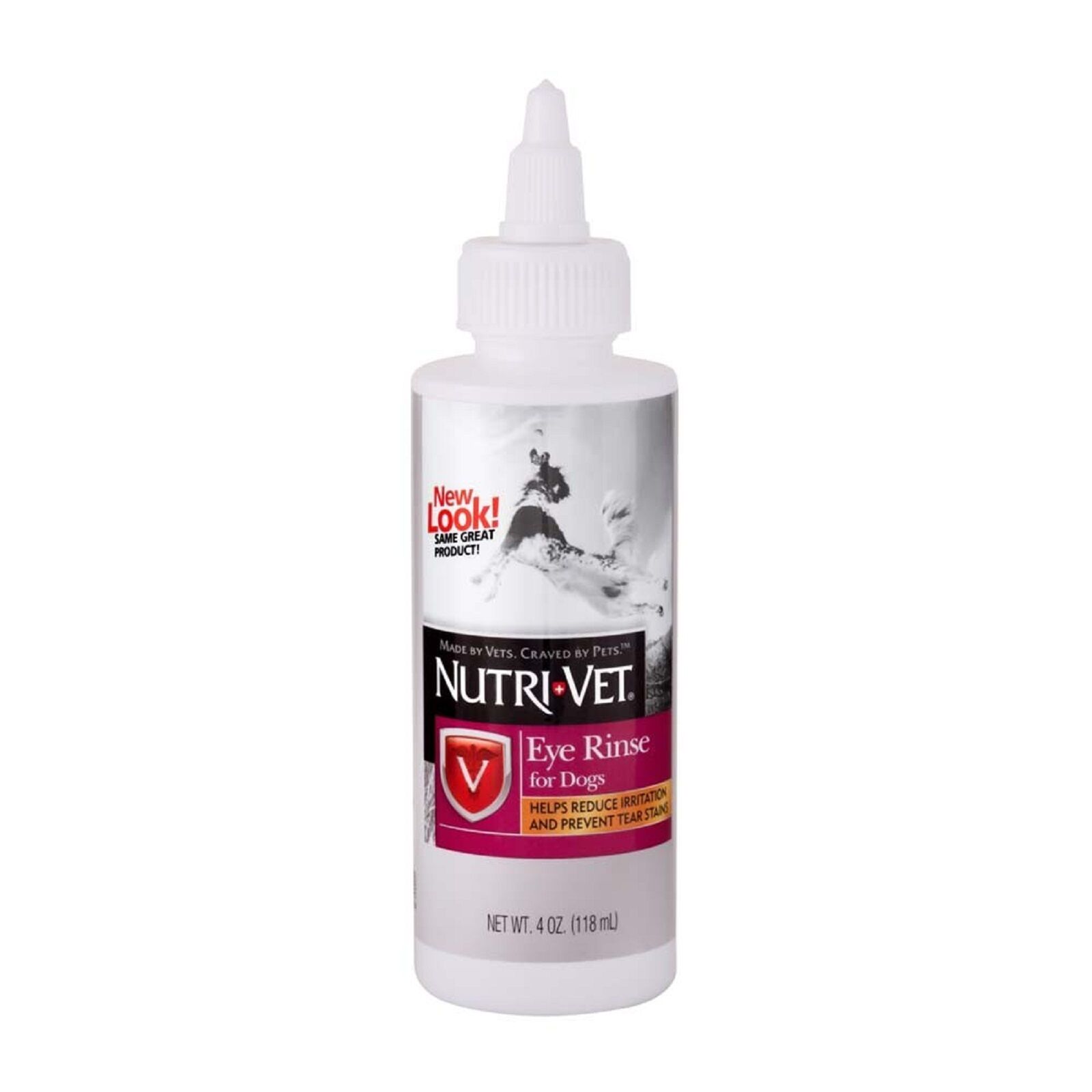-40%
DOG CAT Dry Eye Drops: Artificial Tears, Itch, Red, Pink, Conjunctivitis, KCS
$ 10.53
- Description
- Size Guide
Description
Vision Tears: Treats Your Pet's Dry Eye Conditions & Improves Eye Health Without Vet Help!WHY VISIO TEARS EYE DROPS?
Visio Tears eye drops is a lubricating agent used to treat dogs, cats and other pets with dry eye conditions. It can be used to maintain the lubrication in the eyes and treat symptoms such as irritation, burning and itchiness of the eyes and helps your pet to blink its eyes without discomfort. These pet eye drops are mainly used to treat conditions such as keratoconjunctivitis sicca or tear film deficiencies causing dry eye symptoms such as conjunctivitis, cloudy or dull cornea, increased mucous in or around the eye, corneal ulceration and pigmentation of the cornea due to an advanced eye disease. Visio Tears may also be used as a tear substitute for dogs, cats and other pets with dry eye syndrome, lacrimal secretion deficiency, or any other chronic eye condition where the eye`s cornea needs lubrication. One of the challenges of being a pet owner is that pets are unable to communicate when they are feeling pain or are uncomfortable because of their dry eye condition, so it is necessary to monitor your pet’s behaviors and the development of any alarming symptoms so that conditions can be diagnosed and treated early. Because it can be a cause of a great discomfort for your pet if it suffers from dry eyes, Vision Tears is here to help your pet minimize or get rid of those uncomfortable dry eye symptoms and allow it to live a happier and healthier life.
WHAT IS KERATOCONJUNCTIVITIS SICCA (KCS)?
Keratoconjunctivitis sicca (KCS), or dry eye, is an ocular condition commonly diagnosed in dogs. It is less common in other species. Sometimes called dry eye syndrome, Keratoconjunctivitis sicca (KCS) is characterized by a deficiency and/or poor quality of the aqueous tear film over the surface of the eye and in the lining of the eyelids. The result is severe drying and inflammation of the cornea (the transparent front part of the eye) and conjunctiva (the clear membrane that covers the
sclera
- the white part of the eye), since tears are needed to provide lubrication and nutrition to the cornea, as well as remove debris and/or infectious agents from the eye.
WHAT CAUSES KCS IN DOGS, CATS & OTHER PETS?
Dry eye syndrome can stem from a number of causes depending upon the genetic composition of your pet as well as other environmental factors. The most common cause of KCS in dogs/cats is immune mediated adenitis (inflammation) of the tear glands. Other causes of KCS include but are not limited to:
Immune-mediated diseases that damage the tear producing glands
Congenital disease, such as small or absent lacrimal glands
Infectious disease, such as canine distemper virus and chlamydia conjunctivitis
Endocrine disease, including hypothyroidism, Cushing’s disease, and diabetes mellitus
Neurologic deficiency, such as loss of nerve innervation to the eye
Prolapsed gland of the third eyelid (“cherry eye”) or removal of the gland of the third eyelid
Often a dry nose on the same side as the dry eye(s)
Chronic blepharoconjunctivitis, which is long term inflammation of the conjunctiva and eyelids
Radiation therapy, such as x-rays, near the eye
Drug induced, such as general anesthesia and atropine
Drug toxicity, including use of sulfa derivative medications or etodolac (an NSAID)
WHAT ARE THE SYMPTOMS OF KCS?
It is important to keep in mind that dry eye syndrome often affects both eyes, but one eye may appear to be more significantly impacted than the other. Below are a handful of the most common symptoms associated with dry eye syndrome in dogs, cats & other pets:
Painful, red, and irritated eyes
Swollen conjunctival blood vessels within the eye (may appear overly red)
Chemosis (swelling of the tissue that lines the eyelids and surface of the eye)
Excessive blinking
Holding eyes shut for long periods of time between blinking
Squinting one or both eyes
Corneal scarring (this may appear like a dark film covering the surface of the eye)
Change in appearance of the cornea due to changes in the blood cells, may include pigmentation and ulceration
The appearance of a third eyelid (prominent nictitans)
The discharge of pus or mucus from the eye
Impaired vision or the complete loss of vision may occur in severe manifestations of dry eye syndrome
HOW IS DRY EYE TREATED?
The treatment of dry eye has two objectives: to stimulate tear production and to repair the tear film, thereby protecting the cornea. Visio Tears provides artificial tears and lubricates, while reducing inflammation. The use of these tear replacement lubricating drops helps improve comfort for many pets suffering from dry eyes. Most dogs/cats will receive artificial tear drops (Visio Tears) every three to four hours (2 to 3 times daily), depending on the need and severity of their dry eye condition. This is critical, in order to keep the cornea moist and healthy, especially during the initial phase of treatment. Visio Tears eye drops are safe to give long term and most pets improve dramatically with their consistent use. As mentioned, the majority of pets respond favorably to Visio Tears, but in severe cases of KCS that are poorly responsive to these eye drops, a surgical procedure called a parotid duct transposition may be needed.
WHAT CAN HAPPEN IF KCS IS NOT TREATED?
Keratoconjunctivitis sicca (KCS), or dry eye, if left untreated, may develop secondary corneal ulceration or bacterial conjunctivitis in the eye(s). Corneal ulceration with secondary infection can lead to vision loss or even loss of an eye(s). Chronic, uncontrolled dry eye may also lead to corneal pigmentation, vascularization, and scarring, which may lead to visual impairment.
VISIO TEARS OFFERS THE FOLLOWING BENEFITS FOR YOUR PET
’
S EYES:
Lubricates the eyes
Soothes the eyes
Relieves dry eyes & discomfort
Reduces diseases progression that is causing dry eye
HIGHLIGHTS:
No harmful chemicals (no toxic impurities or preservatives)
Specifically formulated for dogs and cats
Safe and gentle on pet eyes (dogs and cats)
Highest concentrated quality
Less expensive than vet/pet ER visits
Veterinarian approved
COMPOSITION:
Each ml contains:
Polyvinyl Alcohol IP 14 mg
Povidone IP 6 mg
Chlorbutol IP (As Preservative) 5 mg
Sterile Aqueous Base q.s.
BENEFITS OF INGREDIENTS:
In eye drops, polyvinyl alcohol is used to increase the viscosity and thereby prolonging contact time of the active ingredient with the eye(s). Providone is a linear polymer (polyvinylpyrrolidone), which has mucinomimetic properties. This polymer helps to retain the tears on the cornea longer. It acts as artificial tears to help ease dryness and soreness associated with dry eye conditions. Chlorbutol is a preservative that has antibacterial and antifungal properties, which is added to the eye drops to avoid the buildup of bacteria in the solution, thus making them last longer.
PRESENTATION:
15 ml Eye Drop Bottle
BEFORE USE:
Before instilling the eye drops, wash your hands to prevent contamination of the vial. Do not touch the tip of the container with your fingers or make it have contact with any other surface, including your pet’s eyes.
DOSAGE AND ADMINISTRATION:
Dogs/Cats (All weights):
Place 1 to 2 drops in the affected eye(s). It is suggested that you apply every 3 to 4 hours (2 to 3 times daily), but depending on the condition of your pet’s dry eye condition, you may apply as often as needed for dryness and irritation. The correct dosage commonly depends on the pet and the condition being treated.
HOW TO ADMINISTER:
Gently pull down the lower eyelid and form a pocket. Administer 1 to 2 drops into the pocket and gently close both eyelids to allow the drops to spread.
STORAGE:
Store at room or low temperature. Avoid direct sunlight or exposed to a high temperature environment. It should always be kept in a cool and dry place. Keep out of reach of children.
TREATMENT DURATION:
Length of treatment will depend on the pet being treated and their response to the therapy. Do keep in mind that your pet may need a longer duration of use in order to achieve the necessary results depending on the severity of their dry eye problem.
SUGGESTIONS:
It is recommended to continue regular use of Visio Tears eye drops on your pet after the reduction/reversal of the dry eye problem in order to prevent a re-occurrence. As a preventative measure, apply one drop into each eye 2-3 times per day to maintain eye health.
SIDE EFFECTS:
Side effects resulting from use of these eye drops are extremely rare. If you think your pet is showing visual disturbances, cloudy vision or extreme redness of the corneal tissue, stop the use of these eye drops immediately, and if necessary, consult your vet.
PRECAUTIONS & WARNINGS:
Do not use this product if solution changes color or becomes cloudy
If your pet has an allergy to any of the ingredients in Visio Tears, use of it should be avoided
Check the list of other medications causing adverse interactions with the ingredients in Visio Tears. Use of such medications along with Visio Tears eye drops should be avoided
If your pet shows signs of an allergic reaction to these eye drops (hives, swelling, skin rashes, chest pains, trouble breathing or trouble swallowing) stop applying the eye drops, and if necessary, contact your vet as soon as possible
If irritation persists or increases discontinue the use, and if necessary, consult a Veterinarian
If you are not sure your pet has a dry eye condition, then it’s best to consult a veterinarian before administering these eye drops
Do not touch the nozzle tip to any surface since this may contaminate solution
If your pet has open wounds in or near the eye(s), do not use Visio Tears eye drops and get medical help right away
Do not store beyond room temperature and avoid the vial being in contact with direct sunlight
Use the solution within one month after opening the container
You should open only one vial (the one you will use) at a time
Do not use the same vial you are using on one pet on another one
For Ophthalmic use in dogs, cats and other pets only.
Not for injection or oral adminitration
Keep this and all drugs out of the reach of children
PREGNANCY AND LACTATION:
Animal studies are insufficient with respect to reproductive toxicity. The use of Visio Tears may be considered during pregnancy if necessary. These eye drops can be used during lactation.
DISCLAIMER:
Results will vary from pet to pet depending on the severity of their dry eye problem. Some pet dry eye conditions may have gone past the point of effectively treating it with Visio Tears eye drops and may need professional medical attention. If there is yellow pus or blood oozing from your pet’s eye, then you should make a trip to the vet. If you notice that Visio Tears is ineffective and no difference is noticed after a few weeks of use, stop use, and if necessary reach out to a veterinarian.
The makers of Visio Tears have done many trials and have found highly promising results for the treatment of dry eye conditions in pets. However, Visio Tears cannot guarantee that your pet will also have the same results.The Visio Tears solution is given to pets in good faith, however, you must use your wise judgement when administiring these eye drops.
PLEASE NOTE: Visio Tears and all statements are not deemed to treat, cure or be diagnostic in any way. Visio Tears and statements are to support the healthy function of the eye and are in no way a substitute for veterinary diagnosis and treatment. This is to make clear that Visio Tears is not soliciting pets with dry eye problems or claiming a complete cure for dry eyes or any other related eye disease. Every user of Visio Tears accepts that these eye drops work better for those pets who have dry eyes or other similar eye disorders in early stages and are seeking alternative therapies to reverse the eye condition(s). Visio Tears will not be responsible for vision loss and if your pet has a chronic dry eye condition, then it is advisable to seek other solutions aswell, if possible, as untreated chronic dry eye conditions can cause other eye diseases and sometimes even vision loss or blindness.
_gsrx_vers_856 (GS 7.0.20 (856))
